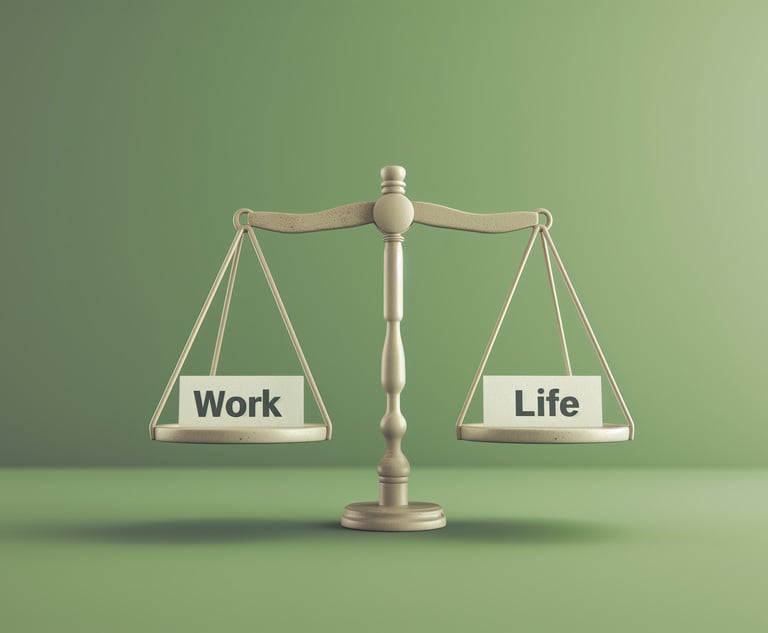Stay Flexible and Get Your Sleep: Life in Lockdown for a Working Parent in France
Marguerite Higgons, an IP lawyer and mother of an 18-month-old daughter, says the trick is in staying flexible and planning for a marathon, not a sprint.
March 25, 2020 at 08:01 PM
4 minute read
Maintaining a law practice while raising children is challenging enough. Doing it confined to home for weeks during the coronavirus crisis with a toddler underfoot and no child care is a whole other level of hard.
For Marguerite Higgons, an IP lawyer at Armengaud Guerlain in Paris and mother of an 18-month-old daughter, the trick is in realizing that you can't plan every day—but you should plan for a marathon, not a sprint.
"Never a break, no time to yourself. It's exhausting," Higgons said by telephone from near Toulon, in the south of France, where she and her husband and daughter are staying during what is referred to in France as the COVID-19 confinement. "You have to stay flexible and find a rhythm, or you won't make it."
To ensure that measures to slow the spread of the virus have worked, the panel of scientists and health experts advising President Emmanuel Macron recommended this week that the initial two-week confinement that began March 17 be extended to six weeks, or until the end of April. French schools and day-care centers, closed since March 13, will probably stay closed at least until mid-April and possibly longer.
In many ways Higgons is lucky. For one thing, she and her firm are accustomed to remote working: Higgons has been telecommuting four days a week and spending one day a week in the office in Paris since her daughter was born. Armengaud Guerlain's practices are consistent with French support of working parents through family-friendly policies like generous parental leave and subsidized child care.
"Our firm has been very early to promote flexibility, for parents especially," Higgons said. "And now that everything can be done online, the mentality about working remotely has evolved here in a positive way."
For another, she is well set up with home offices both in Paris and Toulon, so she can close the door and concentrate. In Paris, her daughter goes to a crèche, or day-care center, for part of the day while Higgons works at home. But in Toulon, Higgons said she often had to catch up on email and reading from her laptop in the living room or kitchen, with one eye on her daughter.
"It changes every day," Higgons said of her new routine. "My husband works from home now, too—he is in finance—and we started out wanting to make a program. But after a few days, we realized it just wasn't possible. We take it day by day."
The day usually begins at 7:30 a.m. with a morning bottle for the baby, followed by family breakfast, where Higgons and her husband "try to contain our daughter" while checking their phones for work emails. Depending on whose business is more urgent, either Higgons or her husband will spend the morning working while the other watches their daughter until lunchtime.
During their daughter's afternoon nap both Higgons and her husband can focus on work for a few hours. After the traditional French goûter, or afternoon snack, it's family time again, including a walk outside if the weather Is nice.
Dinner is also a family affair—a big change from Paris, where Higgons often works late. "This is one way in which things are actually better now—we have more time together as a family, and my daughter loves it," she said.
Once her daughter is in bed, Higgons returns to work if there is something urgent to handle. Even with French courts closed and judges working at a slower pace during the crisis, "cases still move forward, and you have to be diligent," Higgons said.
"With IP work there can be some matters you have to attend to right away," she added. "Take, for example, counterfeit goods on the internet. Even though shops are closed, the internet never sleeps, and the client can suffer immediate and ongoing damage if you don't act."
Otherwise, Higgons says she tries to "stay on my daughter's rhythm" by winding down and going to bed soon after her daughter does, to get enough rest to be able to do it all again the next day—and the next, and the next.
NOT FOR REPRINT
© 2025 ALM Global, LLC, All Rights Reserved. Request academic re-use from www.copyright.com. All other uses, submit a request to [email protected]. For more information visit Asset & Logo Licensing.
You Might Like
View All
Long Hours, Lack Of Boundaries: Associates In India Are Leaving Their Firms


UK Sanctions Regime Put to the Test as Supreme Court Hears First ‘De-Designation’ Case Brought by Billionaire

Trending Stories
Who Got The Work
J. Brugh Lower of Gibbons has entered an appearance for industrial equipment supplier Devco Corporation in a pending trademark infringement lawsuit. The suit, accusing the defendant of selling knock-off Graco products, was filed Dec. 18 in New Jersey District Court by Rivkin Radler on behalf of Graco Inc. and Graco Minnesota. The case, assigned to U.S. District Judge Zahid N. Quraishi, is 3:24-cv-11294, Graco Inc. et al v. Devco Corporation.
Who Got The Work
Rebecca Maller-Stein and Kent A. Yalowitz of Arnold & Porter Kaye Scholer have entered their appearances for Hanaco Venture Capital and its executives, Lior Prosor and David Frankel, in a pending securities lawsuit. The action, filed on Dec. 24 in New York Southern District Court by Zell, Aron & Co. on behalf of Goldeneye Advisors, accuses the defendants of negligently and fraudulently managing the plaintiff's $1 million investment. The case, assigned to U.S. District Judge Vernon S. Broderick, is 1:24-cv-09918, Goldeneye Advisors, LLC v. Hanaco Venture Capital, Ltd. et al.
Who Got The Work
Attorneys from A&O Shearman has stepped in as defense counsel for Toronto-Dominion Bank and other defendants in a pending securities class action. The suit, filed Dec. 11 in New York Southern District Court by Bleichmar Fonti & Auld, accuses the defendants of concealing the bank's 'pervasive' deficiencies in regards to its compliance with the Bank Secrecy Act and the quality of its anti-money laundering controls. The case, assigned to U.S. District Judge Arun Subramanian, is 1:24-cv-09445, Gonzalez v. The Toronto-Dominion Bank et al.
Who Got The Work
Crown Castle International, a Pennsylvania company providing shared communications infrastructure, has turned to Luke D. Wolf of Gordon Rees Scully Mansukhani to fend off a pending breach-of-contract lawsuit. The court action, filed Nov. 25 in Michigan Eastern District Court by Hooper Hathaway PC on behalf of The Town Residences LLC, accuses Crown Castle of failing to transfer approximately $30,000 in utility payments from T-Mobile in breach of a roof-top lease and assignment agreement. The case, assigned to U.S. District Judge Susan K. Declercq, is 2:24-cv-13131, The Town Residences LLC v. T-Mobile US, Inc. et al.
Who Got The Work
Wilfred P. Coronato and Daniel M. Schwartz of McCarter & English have stepped in as defense counsel to Electrolux Home Products Inc. in a pending product liability lawsuit. The court action, filed Nov. 26 in New York Eastern District Court by Poulos Lopiccolo PC and Nagel Rice LLP on behalf of David Stern, alleges that the defendant's refrigerators’ drawers and shelving repeatedly break and fall apart within months after purchase. The case, assigned to U.S. District Judge Joan M. Azrack, is 2:24-cv-08204, Stern v. Electrolux Home Products, Inc.
Featured Firms
Law Offices of Gary Martin Hays & Associates, P.C.
(470) 294-1674
Law Offices of Mark E. Salomone
(857) 444-6468
Smith & Hassler
(713) 739-1250









